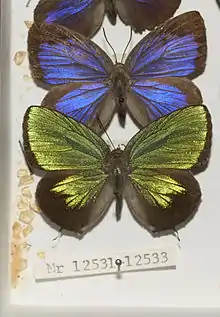Arhopala eumolphus
Arhopala eumolphus, the green oakblue, is a lycaenid butterfly found in the Indomalayan realm. The species was first described by Pieter Cramer in 1780.
| Green oakblue | |
|---|---|
 | |
| Arhopala eumolphus maxwelli, male (top) and female | |
 | |
| Arhopala eumolphus eumolphus, Courvoisier Collection, Basel | |
| Scientific classification | |
| Domain: | Eukaryota |
| Kingdom: | Animalia |
| Phylum: | Arthropoda |
| Class: | Insecta |
| Order: | Lepidoptera |
| Family: | Lycaenidae |
| Genus: | Arhopala |
| Species: | A. eumolphus |
| Binomial name | |
| Arhopala eumolphus (Cramer, [1780]) | |
Description
A.eumolphus is recognisable by the males showing above a bright green lustre; but it has not been decided whether some of these green forms do not differ so much from each other as to be dealt with as separate species. — Typical specimens are from Northern India, from the rainy season. Male abundantly emerald-green with a golden lustre, the jet-black marginal band being narrow on the forewing and broad on the hindwing. Female above dark red-brown with a violettish-blue reflection in the basal portion; hindwing with 1 small tail. In tagore Fruhst., from Assam, the male is smaller, but it has a broader black marginal band than specimens from Sikkim. In the female of this form the blue colour above is darker, but it extends farther across the wing. —[1]
Range

The butterfly is mostly seen in India, ranging from West Bengal and Sikkim to Arunachal Pradesh, and is also found in Nepal, Bhutan, Bangladesh, and Myanmar.[2] Hainan, Southeast Asia, Sumatra, Java, Palawan.
Subspecies
- A. e. eumolphus Sikkim, Assam, Myanmar, Thailand, Hainan
- A. e. maxwelli (Distant, 1885) Mergui, Myanmar, southern Thailand, Peninsular Malaya, Sumatra, Borneo, Bangka - much broader, rounder wings; here the blue reflection of the female is still farther expanded, almost across the whole surface of the wings.
- A. e. adonias (Hewitson, 1862) Java- shows a particularly grey-tinged ground colour of the under surface, on which metallic anal spots show a silvery gloss; the female is above lighter blue
- A. e. caesarion Fruhstorfer, 1914 Sumatra female smaller than specimens from Malacca, and the female above exhibits a broader dark marginal band.
- A. e. aristomachus Fruhstorfer, 1914 Palawan -female very light blue with a broad dark marginal band; beneath with very dark, very contrasting longitudinal bands.
External links
- Savela, Markku, ed. (December 25, 2018). "Arhopala eumolphusCramer, [1780])". Lepidoptera and Some Other Life Forms. Retrieved January 12, 2020.
- Takanami, Yusuke & Seki, Yasuo (2001). "Genus Arhopala (Plate D)". A Synonymic List of Lycaenidae from the Philippines. Archived from the original on October 6, 2001 – via Internet Archive. With images.
Cited references
- Seitz , A. Band 9: Abt. 2, Die exotischen Großschmetterlinge, Die indo-australischen Tagfalter, 1927, 1197 Seiten 177 Tafeln
 This article incorporates text from this source, which is in the public domain.
This article incorporates text from this source, which is in the public domain. - Isaac Kehimkar (2008) The Book of Indian Butterflies, Bombay Natural History Society, Oxford University Press